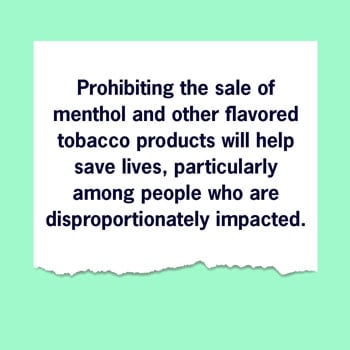Addressing Menthol Tobacco Products
STATES, COMMUNITIES, TRIBES, AND TERRITORIES CAN fairly and equitably implement evidence-based, population-level strategies such as:

- Licensing retailers who sell any types of tobacco products, to better understand who is selling menthol and other tobacco products and to aid with equitable implementation and enforcement of tobacco control policies.
- Prohibiting sales of menthol and other tobacco products.
- Raising the price of menthol and other tobacco products and prohibiting price discounts.
- Curbing the advertising and marketing of menthol and other tobacco products to young people.
- Ensuring that all people who use tobacco products have access to evidence-based quitting resources, including counseling and medication, to help them successfully quit, and tailoring of cessation messages to better reach people who use menthol products.
- Developing educational initiatives that describe targeted tobacco industry marketing tactics and warn about the risks of tobacco product use, including menthol products.
Federal law prohibits cigarettes to be marketed with characterizing flavors, except tobacco or menthol.1 As of March 2023, over 170 U.S. communities have implemented laws prohibiting the sale of menthol and other flavored tobacco products.2 Massachusetts became the first U.S. state to prohibit the sale of menthol and other flavored tobacco products. Its law went into effect in 2020. In December 2022, a similar statewide law went into effect in California.2
Studies of local U.S. policies have shown that restricting the sale of flavored tobacco products reduces the proportion of youth who try or use tobacco products.3, 4, 5 Evidence from other countries supports the public health benefits of removing menthol cigarettes from the marketplace. For example, after laws prohibiting the sale of menthol cigarettes were implemented in Canada, adults who smoked menthol cigarette reported high rates of quit attempts and quit successes.3,6 Adults who had smoked menthol cigarettes daily before the law went into effect and tried quitting smoking were more likely to report having quit cigarettes than adults who had smoked non-menthol cigarettes.3,6
PARENTS AND TEACHERS CAN:
- Learn about menthol and its relationship to tobacco product use and nicotine dependence among young people, how menthol products are disproportionately marketed to specific groups of people, and the risks of using tobacco products.
- Take advantage of quitting resources in their community, if they use tobacco products.
- Talk to children, teens, and young adults about why all forms of tobacco products are harmful for them.
- Develop and equitably implement and enforce tobacco-free school policies that address all types of tobacco products and that incorporate non-punitive penalties or restorative justice principles.
- Implement school prevention and cessation programs that are free from tobacco industry influence, that include education about menthol products, and that can be tailored to groups that the tobacco industry targets with menthol marketing.
HEALTH PROFESSIONALS CAN:
- Learn about menthol and its relationship to tobacco use, nicotine dependence, and reduced cessation success. Learn about how menthol products are disproportionately marketed to and used by specific groups of people.
- Learn about the different types of tobacco products and the risks of using tobacco products.
- Ask about use of all types of tobacco products when screening all patients for the use of tobacco products.
- Encourage patients to quit using tobacco products, and provide information about and connection to evidence-based quitting resources, including counseling and medication.
- Tobacco Product Standards. Federal Food, Drug, and Cosmetic Act. 21 U.S.C. § 387g. 2010 [accessed 2022 May 9].
- Bach L. States and Localities That Have Restricted the Sale of Flavored Tobacco Products [PDF – 91KB]. Campaign for Tobacco Free Kids. 2023. [accessed 2023 June 5].
- U.S. Food & Drug Administration. Review of Studies Assessing the Potential Impact of Prohibiting Menthol as a Characterizing Flavor in Cigarettes [PDF – 1.6MB]. 2022.
- Rogers T, Brown EM, Siegel-Reamer L, et al. A Comprehensive Qualitative Review of Studies Evaluating the Impact of Local US Laws Restricting the Sale of Flavored and Menthol Tobacco Products. Nicotine & tobacco Research. 2022;24(4): 433–443. doi: https://doi.org/10.1093/ntr/ntab188
- Asare S, Majmundar A, Westmaas JL, et al. Association of Cigarette Sales With Comprehensive Menthol Flavor Ban in Massachusetts. JAMA Intern Med. 2022;182(2):231–234. doi:10.1001/jamainternmed.2021.7333
- Chung-Hall J, Fong GT, Meng G, et al. Evaluating the impact of menthol cigarette bans on cessation and smoking behaviours in Canada: longitudinal findings from the Canadian arm of the 2016–2018 ITC Four Country Smoking and Vaping surveys. Tob Control 2022;31(4):556–63.


